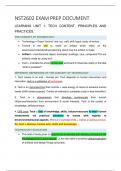NST2602 EXAM PREP DOCUMENT
LEARNING UNIT 1: TECH CONTENT, PRINCIPLES AND
PRACTICES.
THE CONCEPT OF TECHNOLOGY
• Technology = Greek “techné” aka. art, craft, skill; logos: study of techne.
• Techné is the skill to make an artifact which relies on the
awareness/understanding/reasoning about how the artifact is made.
• Artifact = manufactured object, examples: buildings, cars, computers/TVs are
artifacts made by using tech.
• Tech = includes the whole human-built world and it influences reality in the idea
“what is possible?”
DIFFERENT DEFINITIONS OF THE CONCEPT OF TECHNOLOGY
1. Tech means to an end – Human act. Tech depends on human intervention and
interaction; tech is a collection of techniques.
2. Tech is an instrument/tool that controls + uses energy of nature to advance human
needs (fulfil human purpose). Combo of methods to complete a task in less time/effort.
3. Tech is a phenomenon that develops continuously from human
influences/interaction from environment & social interacts. Tech is the combo of
knowledge, skills/technique.
4. DBE says: Tech = Use of knowledge, skills, values/resources to meet human
needs/wants via practical solutions to issues with regards to
environmental/social aspects. Without knowledge/skills = makes a useless product.
So, tech = devices, human acts, skills and knowledge.
TECHNOLOGY EDUCATION
• This field of study gives Ls opportunity to develop tech literacy and acquire NB
knowledge/skills to solve issues. Ls are also able to practice critical evaluation
of artifacts and design things using tech.
, • Tech as a subject = to produce engineers, technicians and artisans. NB to
develop a society which is tech literate = “ability to use, understand, manage
and evaluate tech.”
• Aim of tech subject = Ls to be innovative + develop creative/critical
thinking skills (primary aim), secondary aim = Ls who are able to manage
time/resources effectively. Team work skills is a nice added bonus.
• Specific aims of Tech Edu in Senior Phase:
• develop and apply specific design skills to solve technological problems
• learn and understand the concepts and knowledge used in Technology
Education and use them responsibly and purposefully
• appreciate the interaction between people’s values and attitude,
technology, society and the environment
• Key ideas: Learn how to solve probs creatively; use real-world issues; combine
thinking skills (abstract/true understanding); evaluate existing
processes/products; engage/use knowledge.
DESIGN
➢ Design promotes creative PS and incl. design, practice and design theory.
➢ Design process (diagram ->) Prob identify
➢ From this process comes new environments, systems, services/products
➢ Things might be made by hand/mechanical/electronic methods Planning
➢ Design contributes to society via develop useful products which are attractive
to nature. Research
➢ Products benefit/influence society + physical environment
➢ Design gives Ls skills = visual literacy/critical/creative thinking/ Innovation
self-discipline/leadership/resourceful/quick thinking/business skills
team work/action planning. Conceptualisation
➢ Design gives Ls opportunities:
➢ develop the ability to analyse, invent, create and construct Experimentsation
visual language, knowledge, technical abilities/skills from a concept or
idea, production and the setting relevant for design. Critical Reflection
➢ Explore/handle material skilfully, perform a task with less effort, being careful
without wasting, safely and responsibly.
, ➢ Understand (learn about) the social and historical benefit of design in terms of
economic growth, business opportunities and continuous development
➢ Design as a subject addresses these topics:
Design process + influencing factors
Design production/time management/safe practices
Design theory = design literacy, history of design + design in
sociocultural, environmental + sustainability context.
THE NATURE OF TECHNOLOGICAL KNOWLEGDE (TK)
Tech acts involve various dimensions (how to look at something) and demand
knowledge/understanding from other areas such as maths, science,
economics, social studies.
Many different tech acts: goods, textile and civil engineering.
Influences a knowledge base because people look for unique
procedures/concepts that define tech.
Tech needs high-order thinking to develop solutions. Conceptual/procedural
knowledge will be discussed below.
CONCEPTUAL AND PROCEDURAL KNOWLEDGE
Conceptual Knowledge Procedural Knowledge
- System concepts - Design (central to PK), problem solving,
- Control system = specific view of a planning, systems analysis,
system, both process of world & system optimisation, modelling, strategic
conceptual framework for a viewing thinking.
system. - Design = creative, repetitive, open-
- Civil tech: different sets of concepts from minded procedure of creating/making
those find in electrical tech/mechanical systems and processes.
tech. - In Tech: Ls need to design artifact to
- Relationship between items & solve issue/meet needs.
knowledge. - Ill defined problem aka problem does
- Example: Hydraulic system: observe not have a clear definition.
relationship of forces, 1st/2nd rule of - Tech Ed – Design: IDMEC process.
hydraulics, Pascals Principle, - Problem solving = high order PK entails
compression + mechanical advantage. = interpret, analyse, evaluate.
, - Not merely factual knowledge but incl. - Heuristic (Heuriskein – Greek) to find
ideas that stimulate thinking skills for tech out/discover. Ls are allowed to find
acts. things out/discover on their own what
the lesson entails.
- Heuristic approach = learn via doing it
independently, not just instructed to do
so.
- Heuristic approach encourages Ls in
Tech Ed to discover new techniques
via PK.
- Strategic thinking = allow Ls to discover
tech solutions independently via
recurring steps + being mindful of
thoughts.
- Algorithm = mathematical
instructions/rules to calculate an answer
to a prob -> Seen as PK to prob solve.
- Metacognition = awareness +
understanding of personal thought
processes. Think about thinking.
- Tech Ed, metacognition is NB = Ls think
about what they want to achieve and
takes mindful steps to get to the end
point.
- procedures being followed to
accomplish a certain task.
PRINCIPLES AND PRACTICES RELATING TO TECHNOLOGY EDUCATION
NCS based on 7 principles applicable to Tech Edu (module only looks at highlighted):
• social transformation
• active and critical learning
• high knowledge and high skills
• progression
• human rights, inclusivity, and environmental and social justice




